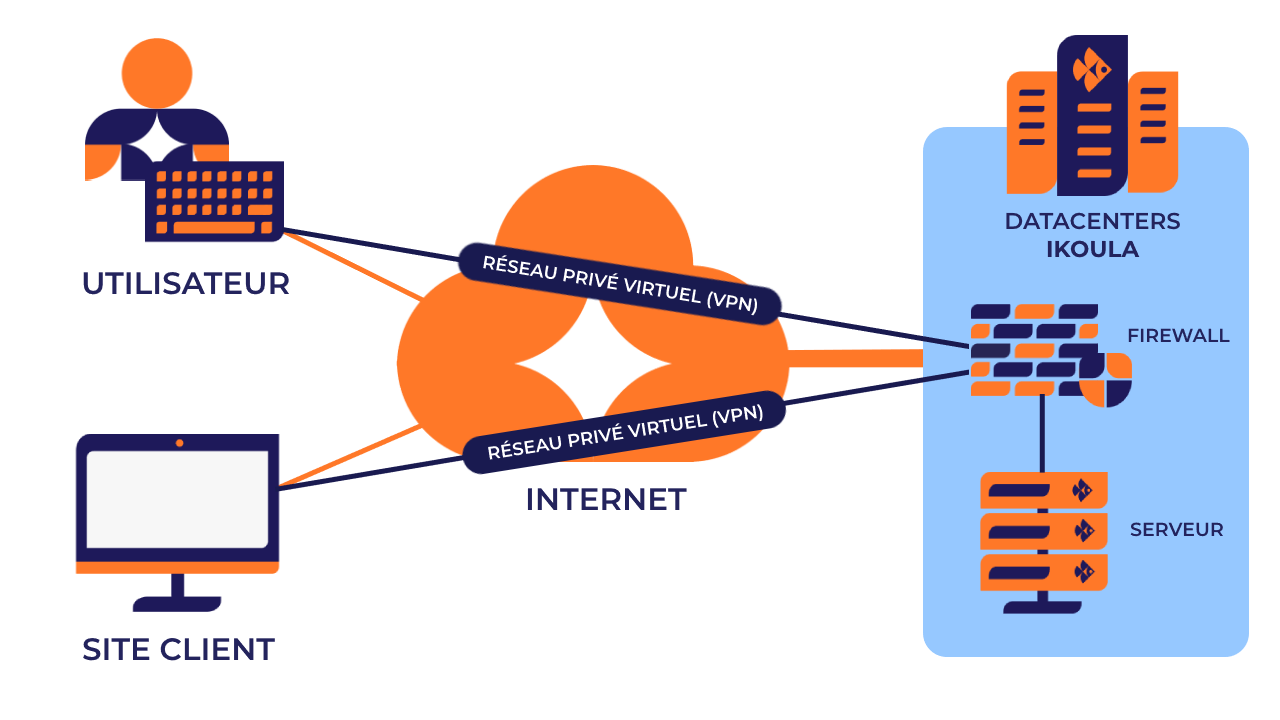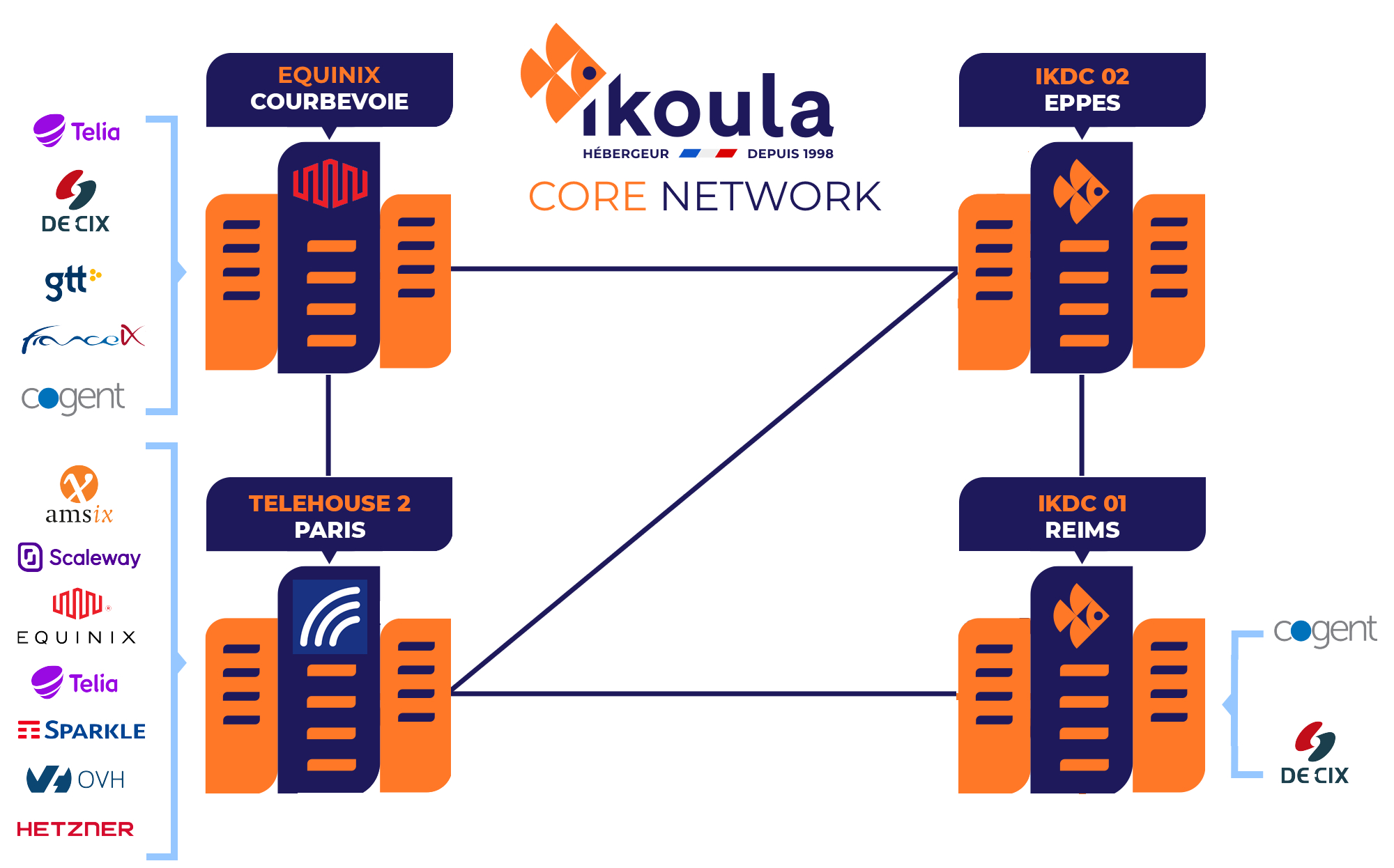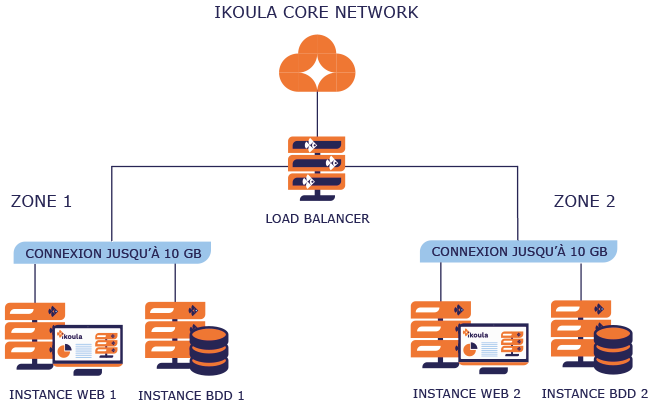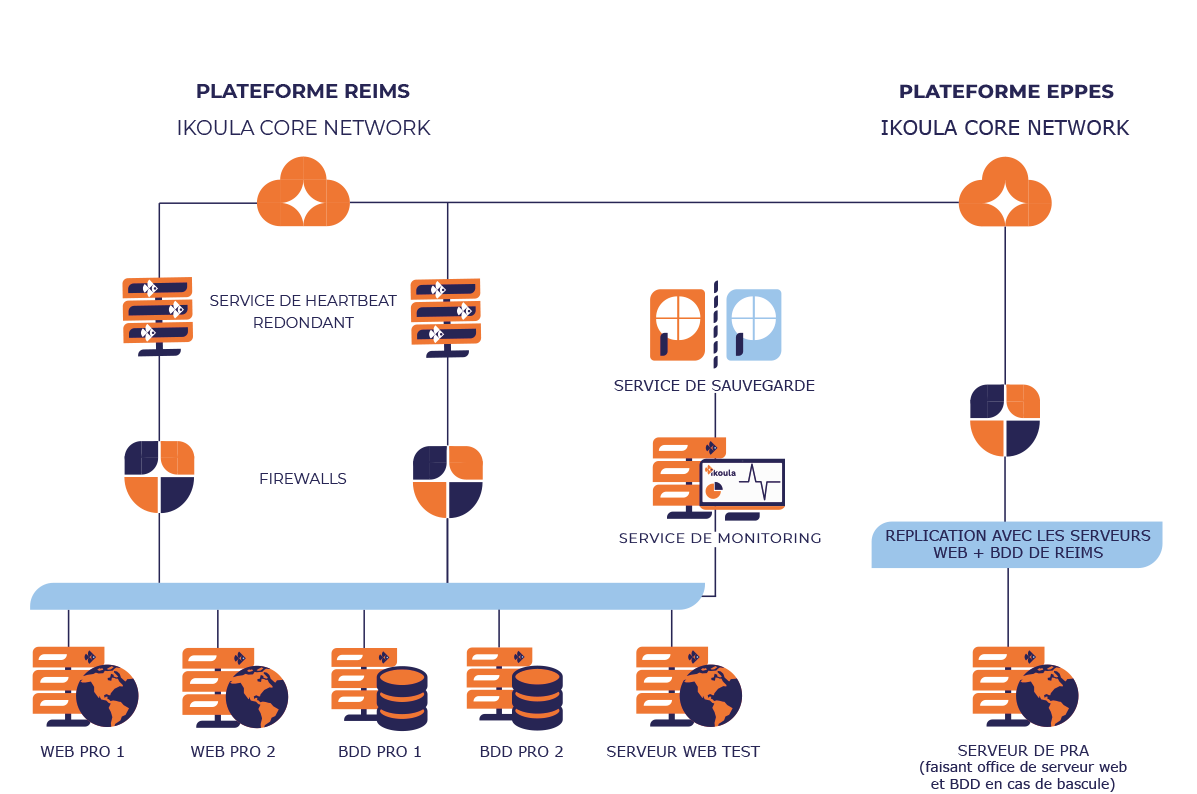
Network and security services
Discover the applications of our network and security services
IKOULA, web hosting provider since 1998, offers several security solutions and options for your network as part of its customised platform offering. Thanks to our expertise, we support our customers in securing their infrastructure in order to protect your data, which is your company's main resource, against DDoS attacks, etc.
VPN (Virtual Private Network)
Sets up a virtual tunnel to transport encrypted information between two physical points.

What is it for?
VPN is a highly effective solution for protecting your sensitive data, especially when connecting to public networks with less security. Thanks to it, you can travel peacefully while staying connected, share your documents privately, all under cover of maximal security.
How does it work?
Our VPN solution is included in our firewall solution.
This is a virtual information transport tunnel encrypted on two physical points and connected to a redundant backbone, on a high-speed network based on more than a dozen operators.
Ask for a customized quote
Data encryption
High-speed network
Redundant backbone
Bandwith
IKOULA, web hosting specialist, offers a bandwidth solution for your information system. Bandwidth is included in our Cloud, Co-location offers as well as in other services.
What is it for?
Bandwidth makes your services accessible on the Internet.
How does it work?
Thanks to our transit operators and our numerous peering agreements on several exchange points, you will benefit from an access to a redundant multi-operator network, ensuring an optimal availability of your services on the Internet.
As an option, you can choose a 10G connection, dual network uplink or additional public IP addresses. You can also import your own IP addresses via the BYOIP (Bring Your Own IP) function to ensure continuity of connectivity for your services.
Ask for a customized quote

Numerous peering agreements
1G fibre connection, 10G optional
Redundant multi-operator network
Load balancing
Setup of equipment to distribute traffic towards various servers.

Load balancing is very useful during periods of heavy traffic. Thanks to appropriate equipment, you can distribute traffic towards various servers. This increases the fault tolerance of your servers.
Ask for a customized quote
Site availability even during peak periods
Application redundancy
Load balancing between servers
Business continuity plan / disaster recovery plan
IKOULA implements disaster recovery and business continuity solutions that meet the highest standards (resilience, flexibility, security, strong connectivity), at a controlled cost.
Our solutions are deployed in our 2 proprietary Data Centres, located 50 km apart.
Needs:
Mitigate the risk of local breakdowns / equipment breakdowns or even complete site breakdowns
Ensure the availability of a website (e.g. e-commerce)
Benefits:
Inter-site data replication to guarantee service continuity and data integrity
24/7 multi-site managed services and guaranteed Service Level Agreements (SLAs)
Ask for a customized quote

Floating IP addresses
Many businesses fear that their applications will suddenly go down and their website will be offline as a result of a cyber-attack or operational incident. Such unavailability can lead to loss of data and productivity, as well as loss of revenue.This situation can now be avoided thanks to floating IP addresses, a truly proactive solution that operates like a natively managed disaster recovery plan. Thanks to this system, companies can make the IP of their servers "floating", enabling traffic to be redirected to another machine located in a separate datacentre, in order to prevent and minimise any service interruptions (without being dependent on DNS). These floating IP addresses act in the same way as redundancy.
Help & FAQs
The most frequently asked questions
- What is a VPN?
VPN is the acronym for “Virtual Private Network”. When you surf the Internet without a VPN, that is, publicly, and send emails or share files, you generate traffic on a shared virtual network. You cannot leave this network without leaving a trace behind you. This information can then be easily intercepted and hacked.
A VPN gathers your information via an encryption system. Your data then cannot be decrypted by other key players such as your Internet provider or other websites in general. The encryption is carried out as per different protocols (PPTP, OpenVPN, IPSec, etc.). This encryption creates a private channel, that is, a closed line between the customer using the VPN and the server VPN. This is why the VPN service always needs a user and a supplier.
VPN is often used within the context of teleworking to guarantee the employee a secure connection with the company’s tools. - What is a load balancer?
By definition, load balancing is a group of methods used in the IT world to:
- Increase processing speed (which facilitates an increase in the number of possible visitors on a website by increasing the number of hosts available.)
-Optimise the processing of requests and thus guarantee a high level of service availability. - What is a firewall?
A firewall is a digital tool (hardware and/or software) designed to protect a network’s data (protection of a personal computer linked to the Internet, for example, or protection of a business network). It facilitates the guarantee of data security on a network by controlling outputs as per the rules defined by its administrator. The firewall secures the network, server infrastructures, and physical machines.